Yiddish with Dick and Jane (5 page)

Dick and Jane and Sally go to Mother’s house.
Mother
kvells
when she sees Sally.
“Sally!” says Mother.
“You look wonderful.
You have not changed a bit.”
“Yes I have, Mother,” says Sally. “I am fat and I have a mustache. I am a big
meeskite
.”
“You are not fat, Sally,” says Mother. “You are
zaftig
.”
“Mother,” says Sally. “Look at me.”
“I am looking at you, Sally,” says Mother.
“You look just like you used to.”
Mother holds up a picture.
It is a picture of Dick and Jane and Sally.
In the picture they are children. Mother and Father and Spot and Puff are also in the picture.
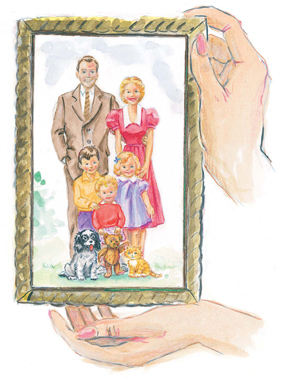
“See?” says Mother. “Everyone is so
freylech
.”
Sally points to the picture.
“I am not like this anymore, Mother. The world is not like this.
People are not nice.
They are mean.
I am on MatchMeIfYouCan.com and every man I meet is a
shlemiel
.
“I am lonely, frustrated, bored, and overweight.
My boss is a
putz
and I hate my hair.”
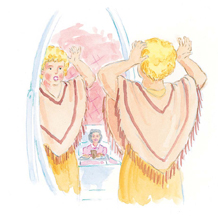
“Your hair is beautiful, Sally,” says Mother.
“You did not help me to get ready to live in the real world!” cries Sally.
“I raised you to live in the world that I lived in, dear,” says Mother.

Sally gives up.
She goes downstairs.
Priscilla is dusting in the living room.
She is smoking a big cigarette that she rolled herself.
“Did you have a nice visit with your ma?” asks Priscilla.
“It made me sad,” says Sally.
“Why are you sad?” asks Priscilla. “Your ma is happy.
Your brother Dick and sister Jane are happy, too.
The whole
mishpocha
is happy.”
“Mother and Dick and Jane
are
happy,” says Sally.
“But I am not.
I live in the real world.
Mother and Father did not teach me how to live in the real world.
I do not know how to deal with all of its
mishegas
.”
Priscilla hands Sally the cigarette. “Take a toke of the spliff and you be all right,” says
Priscilla.
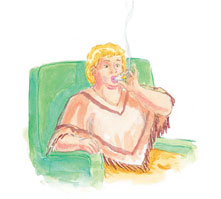
Sally takes a toke of the spliff.
It is a
mechayeh
.
“We always being raised to live our parents’ life,” says Priscilla.
“And their parents raised them the same way.
That’s why we got to go out into the world and unlearn it all.
You think my ma taught me to come to the U.S. to work for some white
alter kocker
?”
Sally thinks that Priscilla is very wise.
“I have to ask you a question, Priscilla,” says Sally.
“Do you have any
rugalach
?”
The next day Dick and Jane take Sally to the airport so she can fly back to Berkeley.
“We are so glad you visited, Sally,” says Jane.
“I am glad, too, Jane,” says Sally. Sally kisses Dick and Jane good-bye.
“Thank you for taking good care of Mother,” says Sally.
“And thank you for hiring Priscilla. She is a real
chachem
.”
Sally goes through Security.
Dick and Jane watch as Sally empties the
dreck
from her purse. It goes through the X-ray machine.
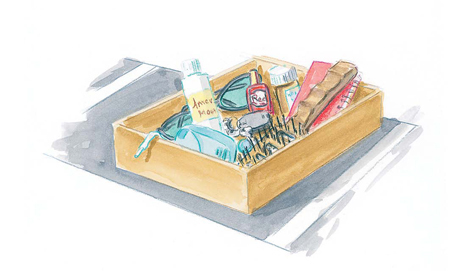
Sally waves and walks off toward her plane.
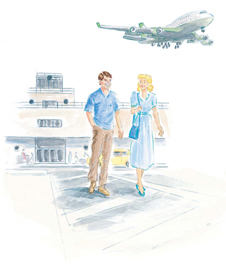
“I have an idea, Dick!” cries Jane. “Someday soon, let’s all go visit Sally in Berkeley.
We will bring Katie and Scott and Alice and Zach and we will not tell Sally we are coming.”
“That is a fine idea, Jane,” says Dick. “Won’t Sally be surprised!”
(But that is a whole different
megillah
.)
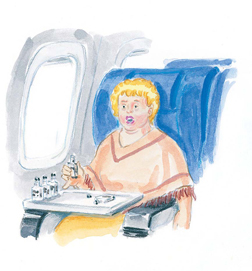
The End
Why, people have asked, drag Dick and Jane into a book about Yiddish?
Our answer is: We haven’t. We’ve dragged Yiddish into a book about Dick and Jane — and about the sunny pastoral world they share with friendly milkmen, doctors who make house calls, mommies who wear dresses, and daddies who look no older than eighteen.
Yiddish with Dick and Jane
is a parody novelette on a series of important themes: what happens when the idealized universe of our favorite childhood characters collides with modern-day reality, the inevitable limitations of parenting, the sharp contrast between successive generations’ outlooks, and the damage that can result from dealing with a dishonest handbag salesman.
Sally, for once, is the book’s heroine, news of which we know will be received with joy by Sally fans the world over. And her story has nothing to do with learning Yiddish. Rather, it concerns her discovery that the blessings of a perfect childhood can be deceiving, and often have to be paid for later in life.
We use the Yiddish like a series of flares, little bursts of irony, worldliness, and savvy to illuminate the dopey innocence of Dick and Jane’s world. It’s a world in which Sally once lived and which we, as children, once visited and took at face value.
Of course we’re all sophisticated adults now, and impervious to the allure of its cheery, oblivious simplicities. We know better.
But how much better might we know better if our primers had included
mishegas
and
mensch?
— E.W.
Yeah. What he said.
— B.D.
Many of the words defined here have multiple meanings, most of which we ignore. Instead, the entry explains the word’s usage in the text. (This is
Yiddish with Dick and Jane,
not
Yiddish with James Joyce.
) Sources include Leo Rosten’s
The Joys of Yiddish,
some deli’s kooky website, our own personal experience, and our mothers. Faith Jones, at the New York Public Library, helped us sort out conflicting viewpoints.
Note that the letter combination
ch
calls for a guttural rasp in the back of the throat, as in the Scottish word
loch
or the universally (more or less) known toast
L’chaim.
alter kocker
(OLL-ter KAH-ker) – Literally, “old shitter.” A grumpy, cranky, cantankerous old man. A bit more caustic than “old fart.” Can also refer to a woman or a mixed group, e.g., “No way I’m going to the matinee. All the
alter kockers
will still be divvying up the lunch check halfway through the first act.” Often used in its abbreviated form,
A.K
.
bren
(bren) – A person of great vitality, charisma, and energy. From the verb
brennen
, “to burn.” Mnemonic hint: A good way to remember that
brennen
means “to burn” is to recall Walter Brennan, that fiery, smoldering, burning movie and TV actor who played fiery, smoldering Grandpa on
The Real McCoys
.
bubbe
(BUB-eh or BUB-bee or BOOH-beh or BOOH-bee) – Grandmother. Rhymes with . . . well, with something that sounds similar. Its diminutive,
boobeleh,
is a term of endearment or affection between spouses, of parents toward their children, or between showbiz people who are either being heavily ironic or are unaware of the fact that no one has used it in this way with a straight face since 1954.
chachem
(CHAW-chem) – A wise person (man or woman), a sage. To the question “How can you know a person is wise unless you yourself are wise enough to recognize their wisdom?” we say, Don’t ask.